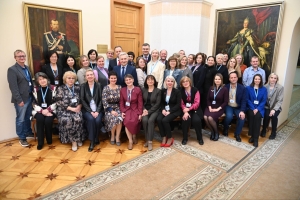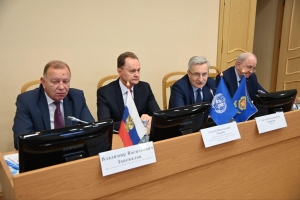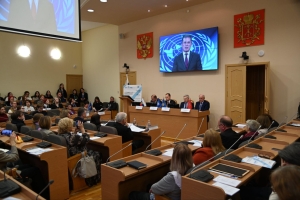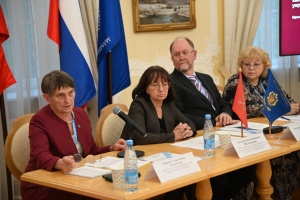On 11 October Herzen University’s Coat-of-Arms Hall opened its doors to welcome the participants of the international conference Quality Assurance in Training Interpreters and Translators in the Era of Globalization, Human-Centric Innovation and Artificial Intelligence. The conference was designed to mark the 15th anniversary of St. Petersburg School of Conference and Translation.
Rector Sergey Tarasov warmly welcomed the participants of the conference. He stressed the substantial contribution SCIT made to strengthening the positions of the Russian language on the global arena. «What matters in interpreting is accuracy and professionalism, he said. Our interpreters work on the top level and facilitate the communication among the nations. The impressive results achieved by SCIT are guaranteed by the techniques, methods, approaches adopted by the SCIT trainers».
Minister of Foreign Affairs of the Russian Federation Sergey Lavrov sent a congratulatory address to the conference participants. He specifically wrote, “Over the years the SChool has strengthened its reputation as a centre of excellence for certified interpreter training”. The address was delivered by Sergey Gritsay, Head of the Linguistic Support Department of the Russian MFA, who in his own person remarked that over the 15 years of its existence SCIT has turned out above 170 language professionals, which makes a substantial contribution to the training of language specialists for the UN linguistic services.
Other guests of honor also addressed the audience with welcoming speeches. Among them were Vladimir Zapevalov, Representative of the Russian MFA in St. Petersburg, and Alexander Prokhorenko, deputy Director of the State Hermitage. Movses Abelian, UN Under-Secretary General for General Assembly and Conference Management, sent in a videoaddress to congratulate SCIT satff and faculty on the occasion of SCIT’s 15th anniversary and to greet the conference participants.
Angelique Antonova, SCIT Deputy Director, moderated the conference’s first plenary. The key speakers were Igor Khovaev, Ambassador-at-large of the Russian MFA, (Perspectives of the Russia-Asia Relations) Tatiana Shlychkova, Deputy Director of the Department for Multilateral Humanitarian Cooperation and Cultural Relations of the Russian MFA, (The Status of the Russian Language in International and Regional Organizations), and Kirill Barsky, Head of the Department of Diplomacy at MGIMO (Perspectives on Russia – China relations).
During panel discussions the participants looked into the aspects of Russia-Asia relations, dwelt on the potential of the Russian language as a means of communication in international organizations, tackled the issues of T&I training and popularization of the Russian culture through foreign languages. Moreover, the participants discussed the transformation of the linguistic profession under the conditions of rapidly changing environment and the changes it necessitates in the training methodology.
SCIT Director Irina Alexeeva and Deputy Director Angelique Antonova gave their presentations on the role of the Russian language in T&I training and quality assurance in interpreter training respectively during the plenary session.
The first conference day was devoted to strengthening the position of the Russian language and culture in the age of global challenges, the second day – to the roadmaps for T&I training.
On the margins of the conference there was an exhibition organized for the universitites to present their T&I programmes. The exhibition also featured the books translated by the SCIT trainers and other participants from English, German, Spanish, French, and Hungarian languages.





 Русский
Русский